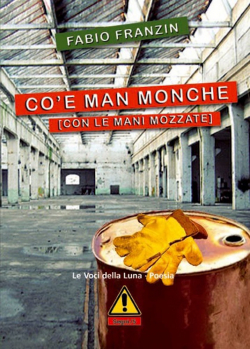Editorial
by Francesca Del Moro
A variety of meanings for the word “nothing”, although such an expression may seem almost an oxymoron, emerges from the poems selected for this issue. The short composition by Caterina Davinio is a geographical vision of nothingness: the author takes us with her on a journey, inviting us to abandon ourselves to an expanse where nature and the elements are the undisputed lords. Through the dogged rhythm of his couplets, with verses fragmented by inner pauses, Daniele Barbieri marks the different steps leading to a sort of annihilation of writing, while in the blunt lines by Fiorenza Mormile, rich in religious references, since the early morning an everyday “fullness” devoid of sense takes the shape of a waking nightmare. Through a sort of poetic shopping list, Mariella Tafuto brings into focus what she lacks in life, reaching a nihilistic conclusion, which is however reversed in a positive way by the last verses; while the enigmatic vision of Rita Stanzione explores a body leaning towards darkness and disintegration, a life urging us on but that we feel as destined to vanish. Silvio Perfetti and Rodolfo Cernilogar linger on an anachoretic “doing nothing”, a peaceful existing and being which can be found both in the little things and in the immeasurable, in a chestnut as well as in God.
Co'e man moche
by Fabio Frazin
As the title (meaning “with chopped off hands”) suggests, the hands are at the core of this book in Venetian dialect with parallel Italian translation, dedicated by Fabio Franzin to the world of work, a theme which is very near and dear to him. The hands are those of the workers, and the verses depict their dejection and despair after the closing of the factory. Experiencing temporary lay-off or becoming redundant workers, these men feel crushed by a sense of uselessness, by those empty hours they’re not used to. Besides than a necessary tool to make a living, hands are also the mirror of their identity. “Look at us, look at us, look at me” repeats Franzin while a glimmer of class-consciousness leaks out when the same colleagues who were ready to wrangle over or to ingratiate themselves with the bosses to the detriment of their peers are shown united in misfortune. Nevertheless, for the time being we can’t see any spark of rebellion among these men, although the TV broadcasts images from protests and demonstrations. They cry, they bang their heads against the wall, they swear, but they remain as submissive as they have always been: we follow them as they wander through the streets of their town, their shoulders burdened with shame because they don’t know how to support their family anymore. They hesitate at the thought of seeking refuge from the cold in a bar, since everything, even a coffee or a glass of wine, has a cost they cannot afford anymore. One of them stops to look at a red sweatshirt in a shop window, recognising the gesture of the beggar in the outstretched hand of the mannequin, and purchases the garment to find some consolation. They too are mendicants begging for a new job from factory to factory, until all hope vanishes and sickness prevails. Some of them are overcome by depression, others get eczema on their hands for having them always “nailed to the void”. Carlo too, who hasn’t been working for six months, rages against his hands, during one of the endless days spent loafing around at home, with no housework left to do, and with the sole company of sleazy TV shows. He picks at his calluses with his nails, cuts them with his teeth. False stigmata dangle from their hands because the recession is torturing and crucifying all these men, like the foreman who used to feel like a king and now wears a crown of thorns made of his concerns, experiencing Calvary at fifty rather that at thirty-three. The religious theme is a unifying thread that runs through the entire book: the economic miracle of North-Eastern Italy is made by a saint in procession, which from the beginning is said to have already left, while hail whips the factory and fog envelops the cluster of towns. Nature seems to take its metaphorical revenge on the buildings which have dethroned it, and eventually “there’s no more grape nor job”. Landscape is another of the author’s favourite themes, here taking the shape of a conflict between natural and artificial sceneries, marking the passage from the seizure of power and the subsequent defeat of industrialization. The author insists on materials, on every kind of tool, leading us to understand the skilful gestures and the physical effort of the labourers, to feel their sense of powerlessness surrounded by the instruments they had been using for so many years. Bright details that eventually vanish in the whiteness. White is the colour of the shirts waving their cuffs like ghosts, similar to the ex-workers who have lost their hands since “nobody requires them anymore”. Meanwhile, snow covers the factory as a white shroud, it covers the dream of Smirald, who came from Albania sixteen years before, the dream of family men to clear the mortgage and pay for their children’s education. Fabio Franzin’s poetry overflows with beauty and humanity; it grips our heart while being at the same time politically explosive.
Fabio Franzin
Co'e man monche
[Con le mani mozzate]
Le voci della Luna, 2011
Untitled
by Caterina Davinio
Open fields
where the nothing blows
with swirls of wind,
dances of dust,
sweat
and insects,
dried grasses envelop
and threaten us with their slender
scratching fingers,
and light that hurts,
our eyes, reason.
from Aspettando la fine del mondo, Fermenti
Wordless
by Daniele Barbieri
I want to write wordless poems, I want to melt
verses in vinegar, verses in mud, I want to talk
with nothing to say, my phrases gloriously
empty, new, lonely, black or full of graphic silences,
full of void, I want to write poems whose
sense is subtracted, with no
value of truth, with no responsibility,
vinegar verses, vainglorious versions of the wind
Hornbeam - Exhaustion
by Fiorenza Mormile
Paths of hate where the soul runs in the morning
while still lying on the bed
the forehead already bleeds from the thorns
of duties whose sense is lost.
Then comes the tear: the invincible capstans
of Routine, Our Lady of everything,
raise the spineless cross:
(will it bear the weight, today as well?)
The shell of rite still remains in place,
but nobody can be rescued any more.
in Variazioni sul Lausberg, DARS Edizioni, Udine, 2003
I don’t have
by Mariella Tafuto
- prayers to say at night
- a body to hold in bed
- your sex between my legs
- another chance of life
- good morning and a smile
- stop it, or I’ll tickle you!
- do me a kiss with the tongue
- a hand on your bare ass
- due bills
- budgets to be balanced
- a curable disease
- a bailiff at my door
- goodnight and sweet dreams
I’ve got nothing but myself and a toy
useless to anyone.
I’m enough for me.
(what I don’t have is more than enough)
Black is this duster
by Rita Stanzione
Black is this duster
with a human shape
pressing, brushing the bones,
the wrong flowers on a single stem
pliant to the mutest stroke.
Here is life again
a guilt on a string. Even now
it’s pushing from end to end
missing from veins without promises.
It starts with the nothing of pores
and fragrances piled up
in the sunset, it’s the sleep melting
the images while carrying the eye
sewn on a piece of dark.

